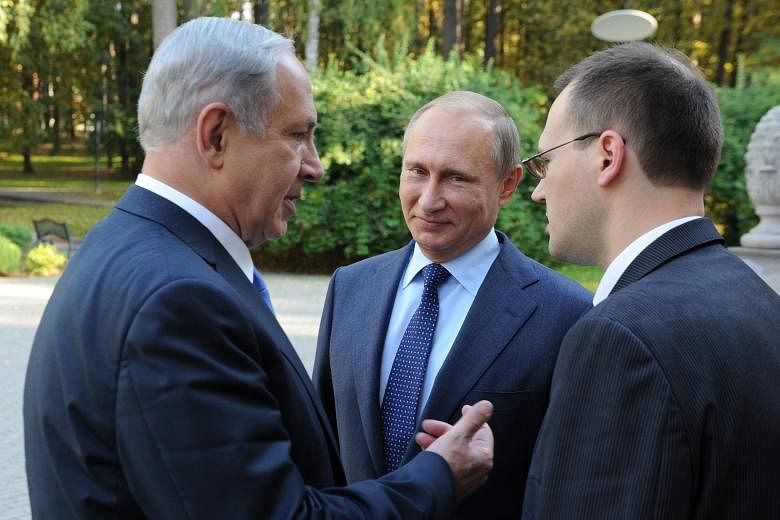Israeli Prime Minister Benjamin Netanyahu claims to have struck a deal with Russia, establishing a "coordination mechanism" to prevent accidental clashes between the Israeli military and Russian troops currently deployed in Syria.
Speaking at the conclusion of talks in Moscow with Russian President Vladimir Putin earlier in the week, Mr Netanyahu hailed the agreement as "very important for Israel's security".
"It's enough to imagine the alternative - a dangerous confrontation with Russia and dealing with these misunderstandings after the fact - to understand the importance of this deal," Mr Netanyahu added.
However, Western analysts downplay the significance of the Moscow agreement. For although there is no doubt that Israel and Russia may have reached some understanding over how to avoid accidentally shooting at each other, Israel continues to have grave misgivings about Russia's military return to the Middle East, and the Jewish state will stop at nothing to have Russia's regional footprint diminished.
It was a report early last month in Yedioth Ahronoth, one of Israel's mass circulation dailies, which first alerted the global media to the fact that Russia had begun deploying fighter jets to Syria.
That report was almost certainly inspired by the Israeli intelligence services, precisely because Israel was growing impatient with the silence which Western governments were observing over this matter. The Israeli objective was to create a public fuss, and get the Americans to act.
The tactic worked as intended, although what subsequently transpired is unlikely to have reassured the Israelis. For although US Secretary of State John Kerry criticised President Putin's move, he also raised the possibility of involving the Russians in negotiating a deal over Syria.
And from an Israeli perspective, that is bad news at almost every level. As seen from Jerusalem, Russia's military return to the region diminishes the stature of the US, raises the possibility of an alliance between Russia and Iran, which may preserve the regime of Syrian President Bashar al-Assad, and is a loss for pro-Western Arab governments led by Saudi Arabia.
Mr Netanyahu's decision to seek an urgent high-level meeting with Mr Putin was therefore an admission that Israel is now taking Russia much more seriously; it was also a warning to the US that if the Americans are prepared to talk to the Russians about the future of the Middle East without consulting regional governments, so is Israel.
Unusually, Mr Netanyahu took on his Moscow trip the chief of staff of Israel's armed forces, General Gadi Eizenkot, as well as the boss of Israel's military intelligence, Major-General Herzl Halevi.
Eager to consolidate his position in the Middle East, Mr Putin had every incentive to be friendly to Mr Netanyahu. Referring to the presence of over one million Jews from the former Soviet Union in Israel and to the fact that Russian is one of the most spoken languages in Israel, Mr Putin claimed that Russia has a "special relationship" with the Jewish state and that "every Russian action in the area has always been responsible" and not intended to harm Israel's security.
It is clear that a deal was reached in Moscow, especially over what Israel considers as its "red lines" in Syria, namely that the civil war in that country should not reach Israel's borders, that the Druze ethnic minority which is present in both Israel and Syria should not be harmed by current fighting and, most importantly, that no missiles or other sophisticated weapon platforms should be delivered through Syria to Hizbollah, the Iranian-sponsored militia in Lebanon which Israel views as its chief security threat.
Israel is likely to have reiterated its stance that if any of these red lines are crossed in Syria, the Jewish state will not hesitate to use military force. The objective of the deal was to put in place an early warning mechanism which will avoid Russian soldiers or aircraft becoming the accidental targets of such operations.
Both sides made concessions. For the deal to work, the Russians would have to reveal their positions and perhaps some of their equipment in Syria, while the Israelis will have to reveal some of their intentions.
Still, beyond reducing the risk of unwanted clashes, Israel and Russia will continue to view each other with suspicion. And there is no question that what Israel wants most is for the US to check and reverse Russia's growing foothold in the Middle East.
Israel's deal with Moscow is, therefore, a matter of necessity, and nothing more. It "reflects Mr Netanyahu's lack of faith in the ability and the intent of the United States to protect Israel's security interests", says Mr Amos Harel, who is one of Israel's top military analysts.

